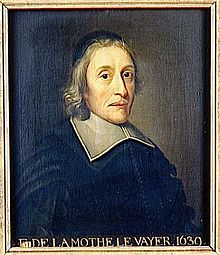
François de La Mothe Le Vayer
Encyclopedia

François de La Mothe Le Vayer (August 1588, Paris
Paris
Paris is the capital and largest city in France, situated on the river Seine, in northern France, at the heart of the Île-de-France region...
- 9 May 1672, Paris), was a French
France
The French Republic , The French Republic , The French Republic , (commonly known as France , is a unitary semi-presidential republic in Western Europe with several overseas territories and islands located on other continents and in the Indian, Pacific, and Atlantic oceans. Metropolitan France...
writer who was known to use the pseudonym Orosius Tubero. He was admitted to the French Academy in 1639, and was the tutor of Louis XIV.
Early years
Born in ParisParis
Paris is the capital and largest city in France, situated on the river Seine, in northern France, at the heart of the Île-de-France region...
of a noble family of Maine, Le Vayer's father was an avocat at the parlement
Parlement
Parlements were regional legislative bodies in Ancien Régime France.The political institutions of the Parlement in Ancien Régime France developed out of the previous council of the king, the Conseil du roi or curia regis, and consequently had ancient and customary rights of consultation and...
of Paris and author of a curious treatise on the functions of ambassadors, entitled Legatus, seu De legatorum primlegiis, officio et munere libellus (1579) and illustrated mainly from ancient history. Francois succeeded his father at the parlement, but gave up his post about 1647 and devoted himself to travel and belles lettres.
Literary career
His Considérations sur l'éloquence française (1638) procured him admission to the Académie françaiseAcadémie française
L'Académie française , also called the French Academy, is the pre-eminent French learned body on matters pertaining to the French language. The Académie was officially established in 1635 by Cardinal Richelieu, the chief minister to King Louis XIII. Suppressed in 1793 during the French Revolution,...
, and his De l'instruction de Mgr. le Dauphin (1640) attracted the attention of Richelieu. In 1649 Anne of Austria
Anne of Austria
Anne of Austria was Queen consort of France and Navarre, regent for her son, Louis XIV of France, and a Spanish Infanta by birth...
entrusted him with the education of her second son and subsequently with the completion of Louis XIV
Louis XIV of France
Louis XIV , known as Louis the Great or the Sun King , was a Bourbon monarch who ruled as King of France and Navarre. His reign, from 1643 to his death in 1715, began at the age of four and lasted seventy-two years, three months, and eighteen days...
's education, which had been very much neglected. The outcome of his pedagogic labors was a series of books comprising the Géographie, Rhétorique, Morale, Economique, Politique, Logique, and Physique du prince (1651–1658). The king rewarded his tutor by appointing him historiographer of France and councillor of state. La Mothe Le Vayer inherited of Marie de Gournay
Marie de Gournay
Marie de Gournay was a French writer, who wrote a novel and a number of other literary compositions, including two proto-feminist works, The Equality of Men and Women and The Ladies' Grievance . In her novel Le Promenoir de M...
's library, itself transmitted from Michel de Montaigne
Michel de Montaigne
Lord Michel Eyquem de Montaigne , February 28, 1533 – September 13, 1592, was one of the most influential writers of the French Renaissance, known for popularising the essay as a literary genre and is popularly thought of as the father of Modern Skepticism...
.
Modest, sceptical, and occasionally obscene in his Latin pieces and in his verses, he made himself a persona grata at the French court, where libertinism in ideas and morals was hailed with relish. Besides his educational works, he wrote Jugement sur les anciens et principaux historiens grecs et latins (1646); a treatise entitled Du peu de certitude qu'il y a en histoire (1668), which in a sense marks the beginning of historical criticism in France; and sceptical Dialogues, published posthumously under the pseudonym of Orasius Tubero. An incomplete edition of his works was published at Dresden in 1756-1759. He was instrumental is popularizing Skepticism
Skepticism
Skepticism has many definitions, but generally refers to any questioning attitude towards knowledge, facts, or opinions/beliefs stated as facts, or doubt regarding claims that are taken for granted elsewhere...
and Sextus Empiricus
Sextus Empiricus
Sextus Empiricus , was a physician and philosopher, and has been variously reported to have lived in Alexandria, Rome, or Athens. His philosophical work is the most complete surviving account of ancient Greek and Roman skepticism....
in particular whom he called "the divine Sexte" (a near blasphemy in Catholic France at the time of the Sun-King, which costed him a higher office of State). Molière
Molière
Jean-Baptiste Poquelin, known by his stage name Molière, was a French playwright and actor who is considered to be one of the greatest masters of comedy in Western literature...
was his close friend and it is rumored that much of the iconoclastic satire of his plays were inspired by Le Vayer's erudite and savage (if carefully hidden) criticism of religious hypocrisy - as expressed in his masterpiece Tartuffe
Tartuffe
Tartuffe is a comedy by Molière. It is one of his most famous plays.-History:Molière wrote Tartuffe in 1664...
(1667), which he defended in a violent (and anonymous) Lettre sur la comedie de l'Imposteur against the religious faction at Court. Le Vayer inspired Spinoza's Treatise of the Three Impostors (ie: Moses, Jesus, Mahomet) .

